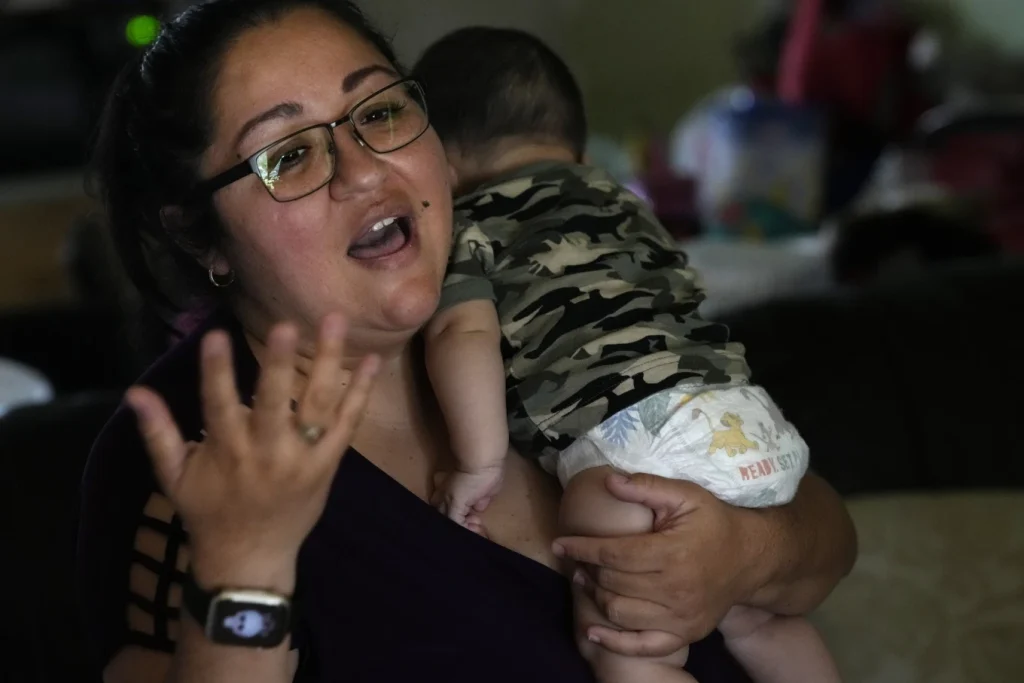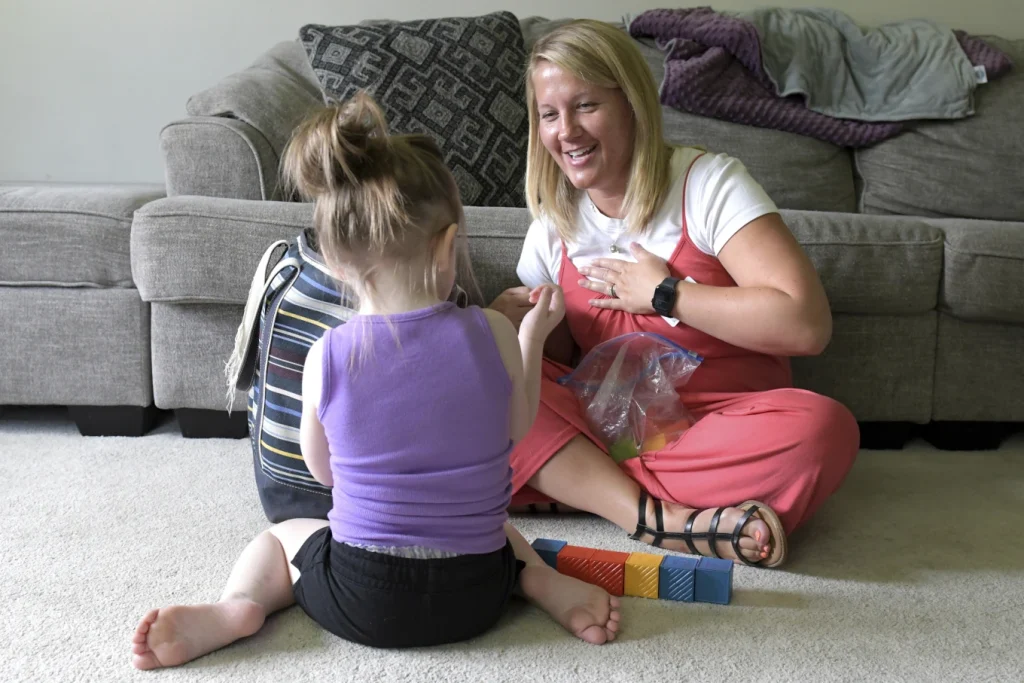In the bustling city of Chicago, a heartwarming story unfolds as we meet Alexander, an energetic and enthusiastic 3-year-old toddler.
Despite his vibrant personality, Alexander faces certain challenges that hinder his ability to communicate effectively. His limited vocabulary and unsteady balance are evident, leaving him unable to express his feelings or seek help when necessary.
Recognizing the importance of early intervention, Alexander’s mother, Hilda Garcia, sought professional evaluation for her son.
Much to her relief, Alexander qualified for five therapies offered by a dedicated U.S. program aimed at addressing developmental delays in infants and toddlers.
However, this relief was short-lived as Garcia soon discovered the unfortunate reality of the federally mandated Early Intervention program – chronic staffing shortages that plague the nation.
This dire situation has left countless desperate parents like Garcia frustrated, as they are aware of the support their children require and the proven therapies that could make a significant difference in their lives. Unfortunately, these parents must endure months of waiting before receiving the vital assistance they desperately need.
After enduring 14 months of relentless phone calls, extensive research, and pushing herself to the limits of her work and childcare responsibilities, Garcia finally secured an in-person early intervention appointment for Alexander.
However, even then, she was unable to acquire all the therapies he required. Overwhelmed, Garcia tearfully recounts the arduous and emotionally draining battle she has faced in securing access to the necessary support. The lack of support throughout this ordeal has left her feeling isolated and alone.
‘The earlier, the better’
Early Intervention, established in 1986, was specifically designed to address developmental delays in children like Alexander as early as possible.
Shockingly, about one in six children in the United States is affected by a developmental disability or other developmental delay, as reported by the U.S. Centers for Disease Control and Prevention. In order to receive federal funding for Early Intervention, all U.S. states and territories are required to offer services to children who qualify under the Individuals with Disabilities Education Act.
However, a significant challenge lies in the scarcity of providers across almost all states. Consequently, many children are forced to endure lengthy waiting periods, sometimes spanning months or even years, before receiving the necessary care. Tragically, some children even age out of the program without ever accessing any services at all.
The COVID-19 pandemic has only exacerbated the chronic staffing shortages within the Early Intervention system.
This is primarily due to the hesitancy of providers to expose themselves to the risk of infection by entering families’ homes, even after restrictions on in-person visits were lifted.
Maureen Greer, the executive director of the Infant and Toddler Coordinators Association, which supports the Early Intervention system nationwide, confirms this trend.
Additionally, families themselves were less inclined to request in-person assistance during the pandemic due to similar concerns.

However, as the number of children seeking services has rebounded, states are now struggling to find the necessary staff to meet the needs of families with young children who have disabilities. Katy Neas of the U.S. Department of Education highlights this growing issue.
In the state of Illinois, where Alexander resides, service delays nearly doubled in 2022, according to Start Early, an early childhood advocacy organization based in Chicago.
Despite the fact that waitlists are technically not permitted since all eligible children are entitled to Early Intervention, they have dramatically increased.
Furthermore, thousands of providers have exited the field, as reported by the Illinois Department of Human Services.
The situation is equally challenging when children turn 3, as the responsibility for providing special education services shifts from Early Intervention to school districts.
However, these systems are also understaffed and overwhelmed, as noted by speech-language pathologist Sarah Ziemba, an Early Intervention provider in Peoria, Illinois.
The consequences of these delays are significant, as they result in the loss of crucial months of development for children.
Acting early is crucial, as it not only ensures that children receive the necessary support at a critical stage in their development but also leads to cost savings in terms of special education and other services later in life.
Therefore, it is imperative that efforts be made to address the staffing shortages and improve the accessibility and timeliness of Early Intervention services.
Only then can we truly provide the support and care that children like Alexander desperately need.
The importance of early intervention in child development cannot be overstated. According to Ziemba, research has unequivocally shown that the earlier children receive support, the better their chances of reaching their full potential as adults.
Unfortunately, not all families have the means to access the therapy appointments necessary for their child’s development outside of the Early Intervention program.
This can lead to a perpetuation of social inequity, as those without private insurance are left behind. It is crucial that we address this issue and work towards providing equal access to early intervention services for all families, regardless of their financial situation.
By doing so, we can ensure that every child has the opportunity to reach their full potential and contribute positively to society.
The assessment made by the individual is well-supported by research findings. In a report recently published by the National Institute for Early Education Research, it was revealed that there exists a significant disparity in the provision of Early Intervention and Early Childhood Special Education services among different racial and ethnic groups.
The study specifically highlighted that Asian, Hispanic, and Black children are less likely to receive these crucial services compared to their white non-Hispanic counterparts.
This discrepancy in access to early educational support is a cause for concern as it may contribute to further inequalities and hinder the overall development and success of these marginalized groups.
The findings of this report shed light on an important issue that requires attention and action from policymakers, educators, and the wider community to address the systemic barriers that perpetuate such disparities in educational opportunities.
The alarming disparities in access to services for Black children, as highlighted in a recent report, defy any plausible explanation rooted in differences in need.
Lead researcher Allison Friedman-Krauss further emphasizes the role that income plays in exacerbating these disparities, noting that poorer states tend to serve a smaller percentage of children.
This glaring issue points to a systemic problem that needs urgent attention. However, the challenge lies in attracting more providers to address this issue, which is contingent upon offering better wages.
In the state of Illinois, Early Intervention providers, who are government contractors, receive no health benefits or paid time off.
Consequently, they can significantly increase their salaries by working in other settings such as hospitals, schools, or nursing homes.
The consequences of this dire situation are becoming increasingly evident, with families losing access to free or reduced-cost therapies.
Consequently, schools are burdened with the responsibility of filling this gap, but they too face a shortage of special education teachers.

As a result, children are falling further behind academically, a distressing trend that has persisted for years. Although Illinois Governor J.B. Pritzker signed a budget in June that included a 10% raise for Early Intervention providers, this measure may not fully compensate for the impact of inflation and is unlikely to stem the steady exodus of workers.
Providers like Ziemba, who have dedicated nearly a quarter-century to this field, attest to the stagnation of wages over the years.
In an attempt to address the issue, the administration unveiled a retention program in July, aimed at incentivizing tenured Early Intervention providers, interpreters, and service coordinators to remain in the field by offering payments of up to $1,300.
A spokesperson for the governor’s office reaffirmed their commitment to supporting service providers and ensuring they receive the necessary resources to care for the state’s children.
However, the urgency of the situation necessitates a comprehensive approach that addresses not only wages but also the underlying systemic issues that perpetuate these disparities.
The impact that therapy can have on an individual’s life is truly remarkable. A prime example of this is evident in the case of Lindsey Faulkner, a devoted mother of four residing in Peoria.
Upon receiving a referral for her 2-year-old daughter, Aria, Faulkner wasted no time in seeking in-person speech therapy sessions.
After a year of working with therapist Megan Sanders, Faulkner is overjoyed with the progress she has seen in her child.
Aria, who was once a hyperactive toddler, is now able to sit and engage with Sanders for most of the session.
She has also started to use sign language and responds to gentle guidance from her therapist. Sanders’ goal has always been to make Aria more capable of expressing herself, and she has certainly succeeded in doing so.

Faulkner initially noticed that Aria’s language development was regressing when the toddler started screeching for everything she wanted rather than asking for help or gesturing.
Following a diagnosis of autism, Aria qualified for speech, developmental and occupational therapy. However, securing an appointment with a developmental pediatrician proved to be a challenge, with Faulkner having to travel two and a half hours away to St. Louis.
Although Aria began speech therapy promptly, she has been on the waitlist for developmental therapy for over a year. Faulkner was shocked and dismayed upon learning about the long wait times.
The positive impact of therapy on Aria’s life is undeniable. Through the dedicated efforts of her therapist, Aria has transformed from a hyperactive and frustrated toddler to a child who is able to express herself in a more meaningful way.
While the wait times for developmental therapy are disappointing, Faulkner’s experience highlights the importance of early intervention and the positive impact that therapy can have on a child’s development.
It is crucial that individuals have access to the necessary resources and support to ensure that they can reach their full potential.
For parents, getting help can feel ‘like another job’
In 2021, Hilda Garcia’s son, Alexander, was qualified for five Early Intervention therapies, namely physical, occupational, developmental, behavioral, and speech.
However, the Garcia family faced a frustrating wait of over a year before Alexander could receive any of these services in-person.
In the meantime, Garcia enrolled Alexander in virtual therapy, but this option proved to be ineffective, especially for physical therapy.
Despite Garcia’s attempts to perform the exercises with her toddler at home, they didn’t yield the desired results. Finally, after much effort, they managed to secure an appointment with a private provider for in-person therapy, bypassing the Early Intervention waitlist altogether.
It became evident to the therapist that there were certain aspects of Alexander’s condition that could only be properly assessed through direct interaction in their home environment.
Garcia, already burdened with childcare and work responsibilities, found herself devoting almost full-time hours to advocating for her son’s needs.
She described the process as feeling like an additional job. Being part of a primarily Spanish-speaking community in West Chicago, Garcia recognized that many parents in similar situations might struggle to advocate for their children in a second language.
She expressed her concern, stating that she couldn’t fathom others going through what she experienced without being fluent in English.

While translators are available, this only adds another layer of complexity to an already arduous process. Moreover, the need for communication during therapy sessions takes away valuable time from the actual therapy itself, making the entire process even more challenging.
Garcia’s worries for Alexander’s well-being are ever-present. She is acutely aware that he is missing out on essential tools for his development.
Furthermore, she fears for his safety as he struggles to communicate effectively and experiences issues with balance. Just this past summer, another child pushed Alexander off a playground set.
Despite the school’s report describing his injuries as a mere scratch, Garcia recounted how he continued to cry out for his mother and pointed to his back.
Desperately trying to assess his pain, she administered Tylenol and inquired about his discomfort, but he couldn’t comprehend her questions.
Garcia promptly contacted his pediatrician, who recommended a visit to the emergency room. There, X-rays were taken, and Alexander’s urine was tested for signs of blood, highlighting the extent of Garcia’s concerns for her son’s well-being.
Upon receiving the results, the disheartening news revealed that her son had experienced “a significant fall.” Garcia, her voice laced with a solemn weight, cradles Alexander’s infant sibling tenderly while recounting the tale.
A sense of contemplation fills the air as she wonders whether an earlier initiation of speech and physical therapy could have made a difference.
Would Alexander have been able to communicate to the other child to cease their actions? Might he have maintained his equilibrium, thus averting the unfortunate incident? Garcia ponders if the Early Intervention in-person session could have been scheduled earlier, potentially leading to a more favorable outcome at present.
